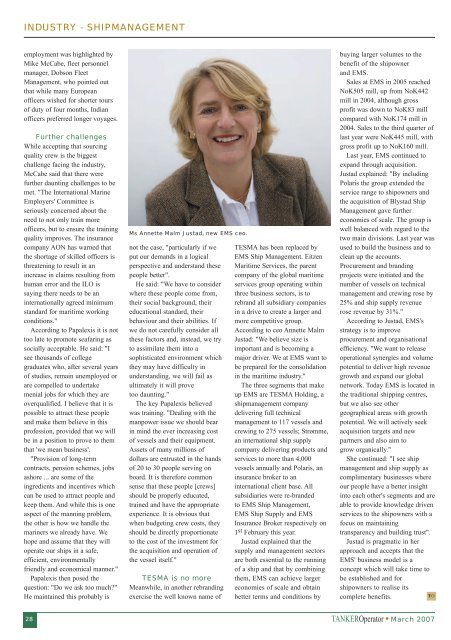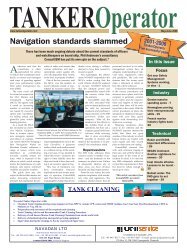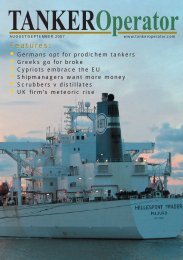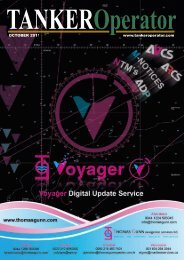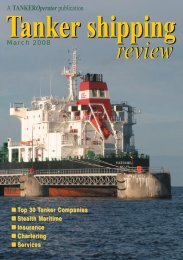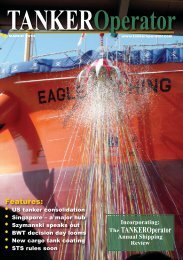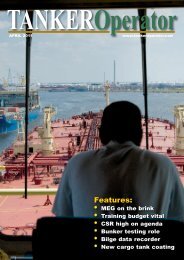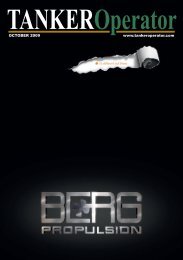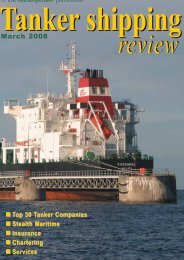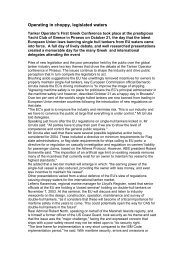Download - Tanker Operator
Download - Tanker Operator
Download - Tanker Operator
You also want an ePaper? Increase the reach of your titles
YUMPU automatically turns print PDFs into web optimized ePapers that Google loves.
INDUSTRY - SHIPMANAGEMENT<br />
employment was highlighted by<br />
Mike McCabe, fleet personnel<br />
manager, Dobson Fleet<br />
Management, who pointed out<br />
that while many European<br />
officers wished for shorter tours<br />
of duty of four months, Indian<br />
officers preferred longer voyages.<br />
Further challenges<br />
While accepting that sourcing<br />
quality crew is the biggest<br />
challenge facing the industry,<br />
McCabe said that there were<br />
further daunting challenges to be<br />
met. "The International Marine<br />
Employers' Committee is<br />
seriously concerned about the<br />
need to not only train more<br />
officers, but to ensure the training<br />
quality improves. The insurance<br />
company AON has warned that<br />
the shortage of skilled officers is<br />
threatening to result in an<br />
increase in claims resulting from<br />
human error and the ILO is<br />
saying there needs to be an<br />
internationally agreed minimum<br />
standard for maritime working<br />
conditions."<br />
According to Papalexis it is not<br />
too late to promote seafaring as<br />
socially acceptable. He said: "I<br />
see thousands of college<br />
graduates who, after several years<br />
of studies, remain unemployed or<br />
are compelled to undertake<br />
menial jobs for which they are<br />
overqualified. I believe that it is<br />
possible to attract these people<br />
and make them believe in this<br />
profession, provided that we will<br />
be in a position to prove to them<br />
that 'we mean business'.<br />
"Provision of long-term<br />
contracts, pension schemes, jobs<br />
ashore ... are some of the<br />
ingredients and incentives which<br />
can be used to attract people and<br />
keep them. And while this is one<br />
aspect of the manning problem,<br />
the other is how we handle the<br />
mariners we already have. We<br />
hope and assume that they will<br />
operate our ships in a safe,<br />
efficient, environmentally<br />
friendly and economical manner."<br />
Papalexis then posed the<br />
question: "Do we ask too much?"<br />
He maintained this probably is<br />
Ms Annette Malm Justad, new EMS ceo.<br />
not the case, "particularly if we<br />
put our demands in a logical<br />
perspective and understand these<br />
people better".<br />
He said: "We have to consider<br />
where these people come from,<br />
their social background, their<br />
educational standard, their<br />
behaviour and their abilities. If<br />
we do not carefully consider all<br />
these factors and, instead, we try<br />
to assimilate them into a<br />
sophisticated environment which<br />
they may have difficulty in<br />
understanding, we will fail as<br />
ultimately it will prove<br />
too daunting."<br />
The key Papalexis believed<br />
was training. "Dealing with the<br />
manpower issue we should bear<br />
in mind the ever increasing cost<br />
of vessels and their equipment.<br />
Assets of many millions of<br />
dollars are entrusted in the hands<br />
of 20 to 30 people serving on<br />
board. It is therefore common<br />
sense that these people [crews]<br />
should be properly educated,<br />
trained and have the appropriate<br />
experience. It is obvious that<br />
when budgeting crew costs, they<br />
should be directly proportionate<br />
to the cost of the investment for<br />
the acquisition and operation of<br />
the vessel itself."<br />
TESMA is no more<br />
Meanwhile, in another rebranding<br />
exercise the well known name of<br />
TESMA has been replaced by<br />
EMS Ship Management. Eitzen<br />
Maritime Services, the parent<br />
company of the global maritime<br />
services group operating within<br />
three business sectors, is to<br />
rebrand all subsidiary companies<br />
in a drive to create a larger and<br />
more competitive group.<br />
According to ceo Annette Malm<br />
Justad: "We believe size is<br />
important and is becoming a<br />
major driver. We at EMS want to<br />
be prepared for the consolidation<br />
in the maritime industry."<br />
The three segments that make<br />
up EMS are TESMA Holding, a<br />
shipmanagement company<br />
delivering full technical<br />
management to 117 vessels and<br />
crewing to 275 vessels; Strømme,<br />
an international ship supply<br />
company delivering products and<br />
services to more than 4,000<br />
vessels annually and Polaris, an<br />
insurance broker to an<br />
international client base. All<br />
subsidiaries were re-branded<br />
to EMS Ship Management,<br />
EMS Ship Supply and EMS<br />
Insurance Broker respectively on<br />
1 st February this year.<br />
Justad explained that the<br />
supply and management sectors<br />
are both essential to the running<br />
of a ship and that by combining<br />
them, EMS can achieve larger<br />
economies of scale and obtain<br />
better terms and conditions by<br />
buying larger volumes to the<br />
benefit of the shipowner<br />
and EMS.<br />
Sales at EMS in 2005 reached<br />
NoK505 mill, up from NoK442<br />
mill in 2004, although gross<br />
profit was down to NoK83 mill<br />
compared with NoK174 mill in<br />
2004. Sales to the third quarter of<br />
last year were NoK445 mill, with<br />
gross profit up to NoK160 mill.<br />
Last year, EMS continued to<br />
expand through acquisition.<br />
Justad explained: "By including<br />
Polaris the group extended the<br />
service range to shipowners and<br />
the acquisition of Blystad Ship<br />
Management gave further<br />
economies of scale. The group is<br />
well balanced with regard to the<br />
two main divisions. Last year was<br />
used to build the business and to<br />
clean up the accounts.<br />
Procurement and branding<br />
projects were initiated and the<br />
number of vessels on technical<br />
management and crewing rose by<br />
25% and ship supply revenue<br />
rose revenue by 31%."<br />
According to Justad, EMS's<br />
strategy is to improve<br />
procurement and organisational<br />
efficiency. "We want to release<br />
operational synergies and volume<br />
potential to deliver high revenue<br />
growth and expand our global<br />
network. Today EMS is located in<br />
the traditional shipping centres,<br />
but we also see other<br />
geographical areas with growth<br />
potential. We will actively seek<br />
acquisition targets and new<br />
partners and also aim to<br />
grow organically."<br />
She continued: "I see ship<br />
management and ship supply as<br />
complimentary businesses where<br />
our people have a better insight<br />
into each other's segments and are<br />
able to provide knowledge driven<br />
services to the shipowners with a<br />
focus on maintaining<br />
transparency and building trust".<br />
Justad is pragmatic in her<br />
approach and accepts that the<br />
EMS' business model is a<br />
concept which will take time to<br />
be established and for<br />
shipowners to realise its<br />
complete benefits.<br />
TO<br />
28<br />
TANKER<strong>Operator</strong> • March 2007


